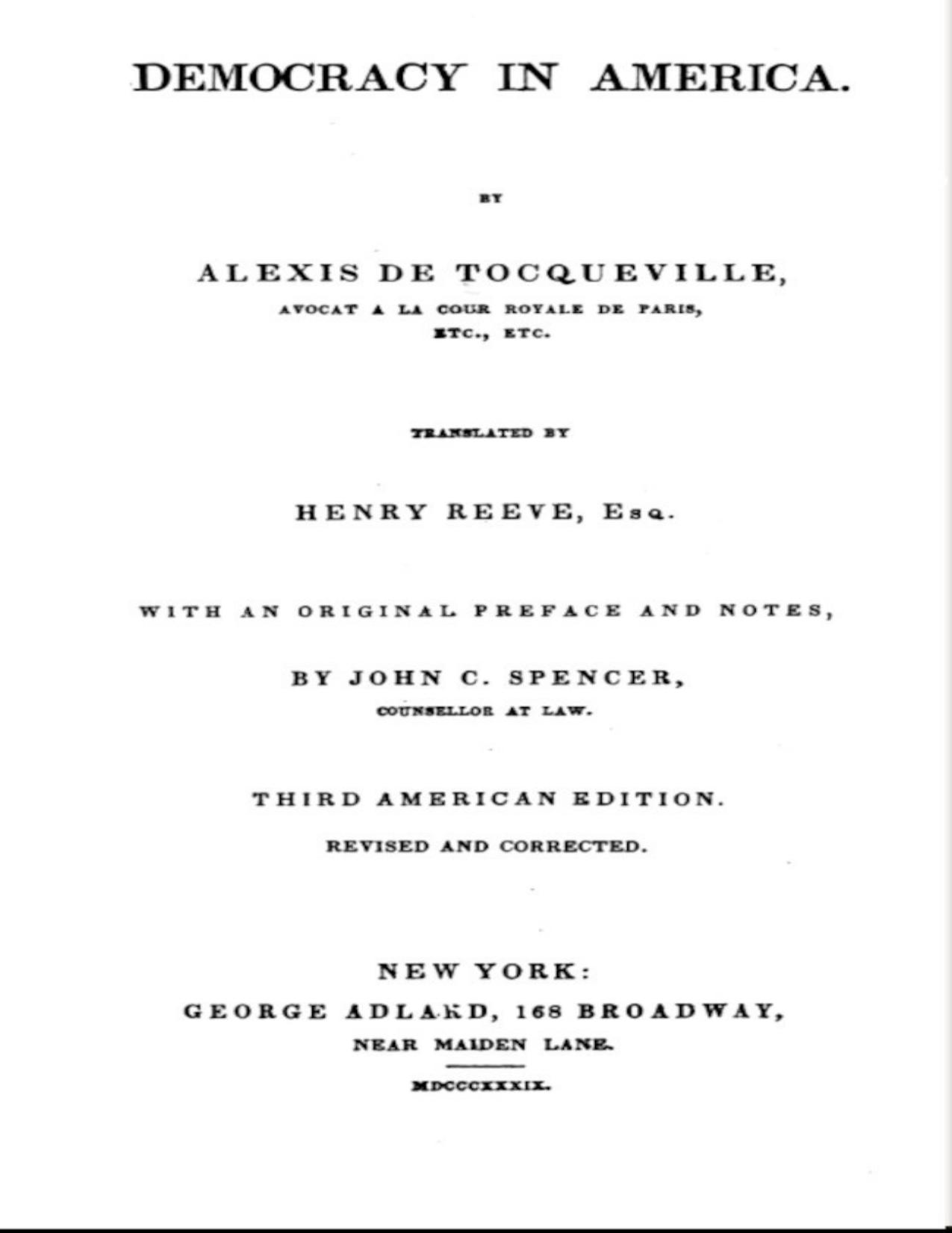Democracy in America â Volume 1 by Alexis de Tocqueville

Author:Alexis de Tocqueville [Tocqueville, Alexis de]
Language: eng
Format: epub, pdf
Tags: United States -- Social conditions, Democracy -- United States, United States -- Politics and government
Published: 2006-01-21T02:00:00+00:00
Chapter III: Social Conditions Of The Anglo-Americans
Chapter Summary
A Social condition is commonly the result of circumstances, sometimes of laws, oftener still of these two causes united; but wherever it exists, it may justly be considered as the source of almost all the laws, the usages, and the ideas which regulate the conduct of nations; whatever it does not produce it modifies. It is therefore necessary, if we would become acquainted with the legislation and the manners of a nation, to begin by the study of its social condition.
The Striking Characteristic Of The Social Condition Of The Anglo-Americans In Its Essential Democracy.
The first emigrants of New EnglandâTheir equalityâAristocratic laws introduced in the SouthâPeriod of the RevolutionâChange in the law of descentâEffects produced by this changeâDemocracy carried to its utmost limits in the new States of the WestâEquality of education.
Many important observations suggest themselves upon the social condition of the Anglo-Americans, but there is one which takes precedence of all the rest. The social condition of the Americans is eminently democratic; this was its character at the foundation of the Colonies, and is still more strongly marked at the present day. I have stated in the preceding chapter that great equality existed among the emigrants who settled on the shores of New England. The germ of aristocracy was never planted in that part of the Union. The only influence which obtained there was that of intellect; the people were used to reverence certain names as the emblems of knowledge and virtue. Some of their fellow-citizens acquired a power over the rest which might truly have been called aristocratic, if it had been capable of transmission from father to son.
This was the state of things to the east of the Hudson: to the south-west of that river, and in the direction of the Floridas, the case was different. In most of the States situated to the south-west of the Hudson some great English proprietors had settled, who had imported with them aristocratic principles and the English law of descent. I have explained the reasons why it was impossible ever to establish a powerful aristocracy in America; these reasons existed with less force to the south-west of the Hudson. In the South, one man, aided by slaves, could cultivate a great extent of country: it was therefore common to see rich landed proprietors. But their influence was not altogether aristocratic as that term is understood in Europe, since they possessed no privileges; and the cultivation of their estates being carried on by slaves, they had no tenants depending on them, and consequently no patronage. Still, the great proprietors south of the Hudson constituted a superior class, having ideas and tastes of its own, and forming the centre of political action. This kind of aristocracy sympathized with the body of the people, whose passions and interests it easily embraced; but it was too weak and too short-lived to excite either love or hatred for itself. This was the class which headed the insurrection in the South, and furnished the best leaders of the American revolution.
Download
Democracy in America â Volume 1 by Alexis de Tocqueville.pdf
This site does not store any files on its server. We only index and link to content provided by other sites. Please contact the content providers to delete copyright contents if any and email us, we'll remove relevant links or contents immediately.
| Elections & Political Process | Ideologies & Doctrines |
| International & World Politics | Political Science |
| Public Affairs & Policy | Specific Topics |
| United States |
The Secret History by Donna Tartt(19048)
The Social Justice Warrior Handbook by Lisa De Pasquale(12187)
Thirteen Reasons Why by Jay Asher(8893)
This Is How You Lose Her by Junot Diaz(6877)
Weapons of Math Destruction by Cathy O'Neil(6264)
Zero to One by Peter Thiel(5786)
Beartown by Fredrik Backman(5737)
The Myth of the Strong Leader by Archie Brown(5498)
The Fire Next Time by James Baldwin(5431)
How Democracies Die by Steven Levitsky & Daniel Ziblatt(5213)
Promise Me, Dad by Joe Biden(5141)
Stone's Rules by Roger Stone(5081)
A Higher Loyalty: Truth, Lies, and Leadership by James Comey(4951)
100 Deadly Skills by Clint Emerson(4920)
Rise and Kill First by Ronen Bergman(4779)
Secrecy World by Jake Bernstein(4740)
The David Icke Guide to the Global Conspiracy (and how to end it) by David Icke(4701)
The Farm by Tom Rob Smith(4502)
The Doomsday Machine by Daniel Ellsberg(4484)
